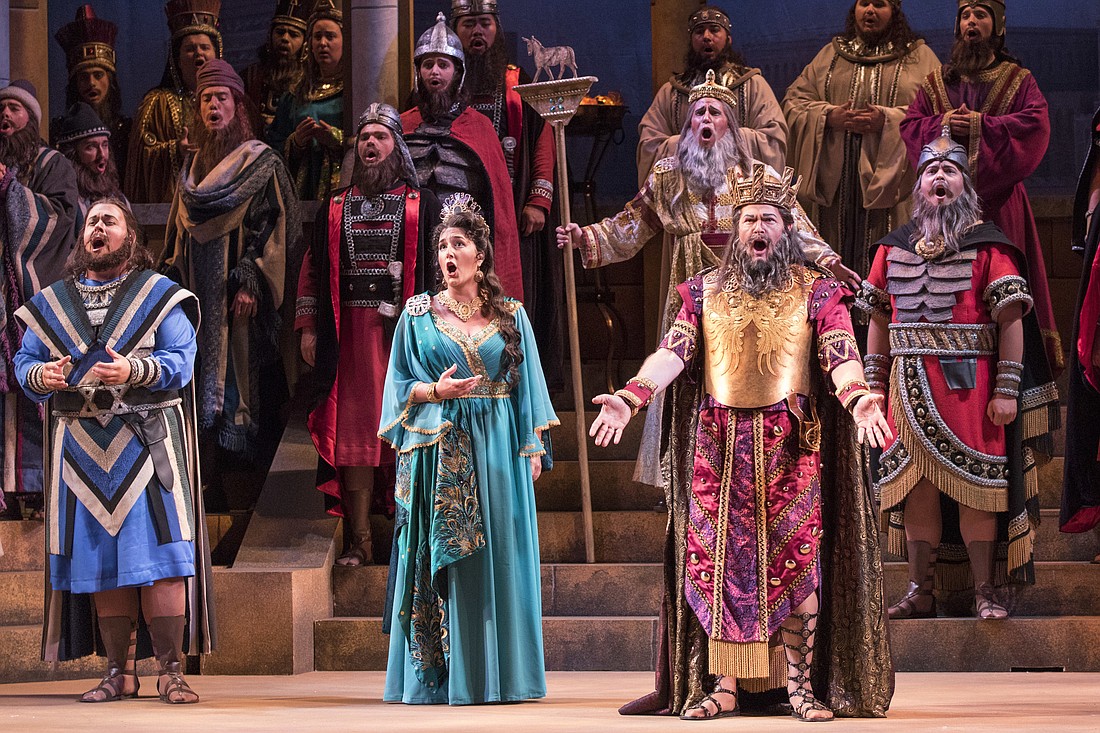- January 6, 2025
-
-
Loading

Loading

It seems only fitting that for its 60th anniversary season the Sarasota Opera would be leading from strength in repertoire: “Turandot,” “The Magic Flute” and now “Nabucco.” The latter was Verdi’s third opera, which raises the standard even higher in this stellar production by the Sarasota Opera.
“Nabucco” is a big story of the Hebrew persecution by the Assyrians in biblical times, and its settings range from the Temple in Jerusalem to the Hanging Gardens of Babylon. And just like the walls of ancient Peking in “Turandot,” the Sarasota Opera was able to create these settings in a most convincing manner.
The story involves an ambitious princess, actually the daughter of slaves, who claims the crown and exiles the Hebrews after the king is stricken with madness. The king recovers and is himself converted as divine power. He then destroys the golden calf of Baal, and the false princess takes poison and dies.
Relating such happenings demands a production with a large cast, large voices and strong support from the orchestra pit.
Happily, all of these came together in an all-out performance led by the strong and exciting voices of Rochelle Bard as Abigaille, the “false” princess, Stephen Gaertner as Nabucco, and Kevin Short as Zaccaria, High Priest of the Hebrews.
The role of Abigaille is demanding on any singer, yet Bard deftly handled every facet, her voice soaring over orchestra and chorus.
Gaertner brought a hefty bright baritone to the role of the King of Babylon, and his madness, recovery and conversion were most convincing.
Zaccaria, High Priest of the Hebrews, was sung by Kevin Short, a last-minute replacement, whose mighty bass voice and presence was as commanding as if he had been in the production from the beginning.
Smaller in scope but not in voice were the roles of lsmaele, nephew of the king of Jerusalem, ably sung by Ben Gulley, and mezzo Lisa Chavez, who was also in great voice as Fenena, daughter of Nabucco.
It was however, the wonderful singing of the opera chorus some 40 strong, performing as Hebrews, Assyrians and soldiers that dominated the evening — no small task, given the strength of the principal singers. Chorus Master Roger Bingaman deserves special accolades for his excellent preparation of these fine singers.
The capacity audience seemed to be waiting for the famous chorus of Hebrew exiles, which became almost a national anthem for the unification of Italy and is certainly that for Sarasota Opera, “Verdi’s American Home.” Beautifully performed and especially moving, “Va, pensiero,” was greeted with such audience enthusiasm that it was repeated, a real rarity for the opera.
Early Verdi operas are difficult to stage effectively, since they can easily become “stand and sing” evenings, with little or no movement or drama on the stage. However, stage director Martha Collins provided both, handling the dramatic situations in a skillful manner that provided plenty of action, yet never detracting from Verdi’s score. She was especially effective in her work with the large chorus scenes so prevalent throughout the opera.
Jeffrey W. Dean’s sets were properly evocative without being overwhelming, and were enhanced by the creative lighting of Ken Yunker. Startling and most effective was the divine destruction of the golden calf of Baal in the final scene, which caused many a gasp in the audience.
Designing and coordinating the almost 200 costumes required for this production fell to the efforts of Nicola Benois, designer and Howard Tzvi Kaplan, costume coordinator who accomplished this great task with seeming ease. Costumes for Abigaille and Fenena were especially beautiful with their vivid colors. Makeup and wig designer Brittany Rappise also deserves special attention for her fine work with all those beards.
All of this, yet the entire evening would have been nothing without the glorious sounds of the orchestra beautifully conducted by Artistic Director Victor DeRenzi. DeRenzi is a Verdi scholar who has led this company through every known work that Verdi wrote, and his love and devotion to the music of the Italian master were evident in every bar. The orchestra also seemed happy to return to the music of Verdi, for its playing was truly inspired in this outstanding performance. Rarely have I heard this score conducted and played so well.
It was a great evening for Verdi, and for the Sarasota Opera.
Friday night’s performance of “The Magic Flute” featured Sarasota native and Youth Opera alumna Adlelaide Boedecker as Pamina in her debut in a major role with the company. She seemed completely at ease with the role both musically and dramatically, and her aria “Ach, ich fühl’s,” was particularly lovely. Boedecker is a Studio Artist this season and we look forward to her engagement as a principal artist in coming seasons.
The production has settled in since opening night and everyone was in good form and voice, with the Papageno of Matthew Hanscom commanding his every scene.
The season’s final offering, a double bill of Donizett’s “Rita” and “Susanna’s Secret” by Wolf-Ferrari, opens March 9.